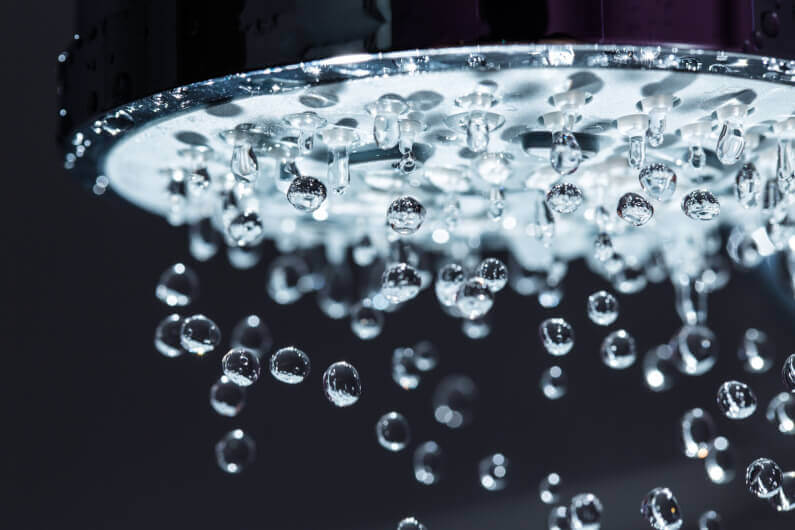Water is essential to our survival but few of us give much thought to its properties or characteristics. After all, whether we use it for cleaning, bathing, or drinking, this clear liquid is pretty much the same everywhere, right?
Not exactly. You might have heard that water can be hard or soft. Eighty-five percent of the US has hard home water so there’s a strong chance that the water coming from your faucets is hard.
But what does it mean for water to be hard or soft? We reveal all in this hard water vs soft water guide.
What Is Hard Water?
As water flows from its source to your home, it often collects minuscule particles of dissolved minerals along the way. These can include calcium and magnesium, both considered hardness minerals. The more hardness minerals present, the harder the water.
Water hardness works on a sliding scale, measured by grains per gallon (gpg) of calcium carbonate. The US Geological Survey measures water hardness as follows:
- Less than 1 gpg is soft water
- Between 1 and 3.5 gpg slightly hard water
- Between 3.5 and 7 gpg is moderately hard water
- Between 7 and 10.5 gpg is hard water
- More than 10.5 gpg is very hard water
Most American homes have at least moderately hard water. Here in Columbia, SC, our water hardness measures 1-2 gpg, making it one of the few areas of the US with soft water.
What Is Soft Water?
As the scale above shows, soft water has minimal amounts of hardness minerals. Soft water areas include the Pacific Northwest and New England in the US as well as some foreign countries, such as Iceland and Scotland.
Chalk and limestone rocks aren’t common in these soft water areas. This means that rainwater–which is naturally soft–doesn’t pick up harness minerals as it flows from its source into homes.
The Risks and Benefits of Water Hardness
While many people assume that hard water is inferior, water quality can vary for both hard and soft water. And, no matter whether water is hard or soft, there are risks and benefits to consider:
Contamination
Hard water contains more minerals but this is not the same as contamination. Contamination refers to germs and bacteria in water.
In contrast, minerals are valuable nutrients for your body, contributing to good health from within. Too much of certain minerals can cause health risks, such as renal problems from too much magnesium. But drinking hard water is unlikely to lead to an overdose of minerals.
Water Taste
People often expect that hard water tastes worse than soft water because of its high mineral content. In fact, minerals improve the taste of water, meaning that softer water lacks taste.
What’s more, the vast majority of US tap water and all bottled water is hard water. Since we’re all so used to drinking hard water most of the time, it’s more likely that you’d find the taste of soft water strange or even unpleasant.
That said, the water coming from your home’s faucets might taste bad for reasons other than its hardness or softness. Water that tastes or smells weird is a common early sign that you need to repipe your home.
Clogged Pipes
While we’re on the subject of pipes, some people believe that the minerals in hard water can clog the pipes in your home. Although this isn’t true for modern homes, hard water can pose a problem for older homes with galvanized pipes. This is because high levels of calcium and magnesium can stick to the inside of galvanized pipes.
If your home is more than 40 years old and still has the original galvanized pipes, a full replacement is in order. The zinc coating on galvanized pipes is prone to rusting and corrosion. This can cause plumbing problems such as low water pressure, leaks, and more.
But more crucially, consuming water from these old pipes can be dangerous as you may be exposing yourself to traces of lead and cadmium. So, while the water in your home may be contaminated, this is because of the material of your pipes rather than the hardness of the water.
Lifespan of Appliances
The dissolved minerals in hard water can be problematic for appliances such as hot water heaters and washing machines.
Hot water heaters, for example, should last eight to 12 years, and washing machines 10 to 13 years. Regular maintenance checks and yearly plumbing inspections can help ensure that your appliances last as long as possible.
Although, homeowners in areas with very hard water may find it beneficial to install a water softener too. This can cut the scaly buildup inside appliances and help prolong their lifespan.
Effectiveness of Soap
One of the most obvious signs of hard water is difficulty in getting a good amount of lather from soaps and shampoos. This is because the minerals in hard water decrease the effectiveness of soap. As a result, people in hard water areas usually have to use larger quantities of washing products than people in soft water areas.
Skin and Hair Dryness
While there’s some debate about whether hard or soft drinking water is better, there’s no doubt that soft water is better for your hair and skin. The dissolved minerals in hard water can strip your hair and skin of natural oils. This causes dryness, irritation, and dullness.
What’s more, having to use more soap means that there it’s more difficult to wash residue away. In hard water areas, the combined buildup of hardness minerals and soap residue can aggravate dryness and lead to limp hair and lackluster skin.
Hard Water vs Soft Water: Understanding the Differences
As this hard water vs soft water guide shows, there are various pros and cons associated with both types of water.
While most of the US has hard water, many American homeowners are choosing to install water softeners to gain access to softer water. If you’re considering this option too, remember that only a licensed plumber has the knowledge and experience to install a water softener according to all relevant plumbing codes.
For more information or to schedule a plumbing service, contact us here today at Plumb Time.










